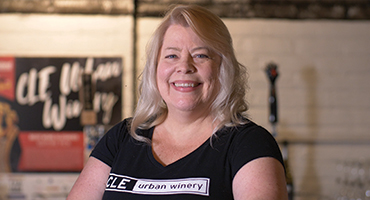In the process of reinventing herself and her career, retired U.S. Navy officer Destiny Burns created a community in an unlikely place: a craft brewery-style winery nestled inside an old auto repair garage in urban Cleveland Heights. Since founding CLE Urban Winery in 2016, Burns has built a resilient business model — not to mention a dedicated following — that has helped grow and sustain her winery even through the pandemic.
After serving 20 years of active duty in the Navy, then working 13 years as a business development executive for the defense industry in Washington, D.C., Burns moved back to her hometown of Cleveland at age 50. Recently divorced and ready to recalibrate, she dreamed of starting her own business related to food and wine, which had always been hobbies of hers as a world-traveling foodie.
Although she brought plenty of experience from her corporate and military background, she “didn’t know how to run a business,” she says — especially “a really complicated business” like a winery that combines manufacturing, retail, wholesale, e-commerce and event management with the stress of operating a bar.
By applying her strategic expertise to serve her local community, Burns established a brand and business plan to build a foundation for growth.
“It’s been very challenging, but it has become what I envisioned: a community center that makes wine,” she says. “I tell my employees that we’re not in the wine business; we’re in the relationship business, and wine is just the catalyst that brings us together.”
Building a brand
Early on, Burns developed three tenets to define the CLE Urban Winery brand: “Good wine made fun that celebrates Cleveland and creates community.”
The first tenet, “good wine made fun,” reflects Burns’ commitment to making CLE Urban Winery approachable through its wide selection and casual atmosphere.
“Our premise is that wine should be a catalyst for connection,” she says, “so we deliberately choose wines so there’s something for everybody.”
From dry red and white wines to sweeter selections, and even wine slushies, wine hot chocolate and food pairings, the winery appeals to a range of palates with the comfort of a hip neighborhood hangout.
Burns’ second commitment is to celebrate her hometown of Cleveland through her products. Although she sources juice primarily from the West Coast, each batch is made and bottled on-site. Labels feature iconic Cleveland cityscapes and names like Cedar-Lee Chardonnay, Lake Erie Riesling and Mighty Cuyahoga Merlot that pay homage to the city. The winery also showcases local artists, musicians and other small business partners.
The third pillar is “do good and create community.” Burns regularly donates to local nonprofits like the nearby Dobama Theatre, Cleveland Food Bank and Graffiti Heart, a community art project. Plus, a portion of proceeds from the sale of Hometown Heroes Peach Chardonnay supports local organizations that honor veterans and first responders.
“I need that philanthropic element to keep my tank full,” says Burns, who served as a volunteer firefighter before opening the winery. “That’s really the most important part and what keeps me going.”
Recover and reset
In March 2020, when Gov. Mike DeWine mandated the shutdown of Ohio businesses in response to the pandemic, Burns immediately retrenched. She laid off her entire staff except for her winemaker and vice president of operations, Dave Mazzone, who stayed onboard to make wine while Burns made deliveries around town. Between e-commerce orders, wine club subscriptions and wholesale orders from local grocery stores, the diversity of Burns’ business model kept CLE Urban Winery afloat until the retail location could reopen.
To plan the winery’s re-emergence, Burns relied on a disaster recovery strategy she’d learned in her previous career called DSRO (Defense, Stability, Reset, Offense).
“When disaster happens, you go into defense mode first,” she says. “You just hunker down and try to survive. But you can’t go right from defense straight to offense because nothing’s normal. So, this DSRO approach helped keep me focused and on track to recover.”
After a couple months of “just trying to survive” during the shutdown, Burns began to focus on stabilizing the business. As the winery reopened and customers slowly returned, she established new cleaning and sanitation protocols and hired back a bartender.
Around the end of 2021, Burns turned toward the reset phase of her strategy by reviving CLE Urban Winery’s event business, making guests feel safe and comfortable hosting showers, weddings and other gatherings in the urban space. Burns also decided to pull back on the wholesale business and reset her focus on direct-to-consumer retail sales.
Over the last couple of years, she says the business has continued to oscillate between “reset” and “offense” as she positions the winery to thrive in an ever-changing environment.
“Right now, our offense strategy is focused on getting more people in the door, through murder mysteries, wine dinners, pop-up shops and other events, Burns says. “We’re trying to engage people to connect and be part of the community. This business is challenging, but it’s successful because of the connections it has created.”


